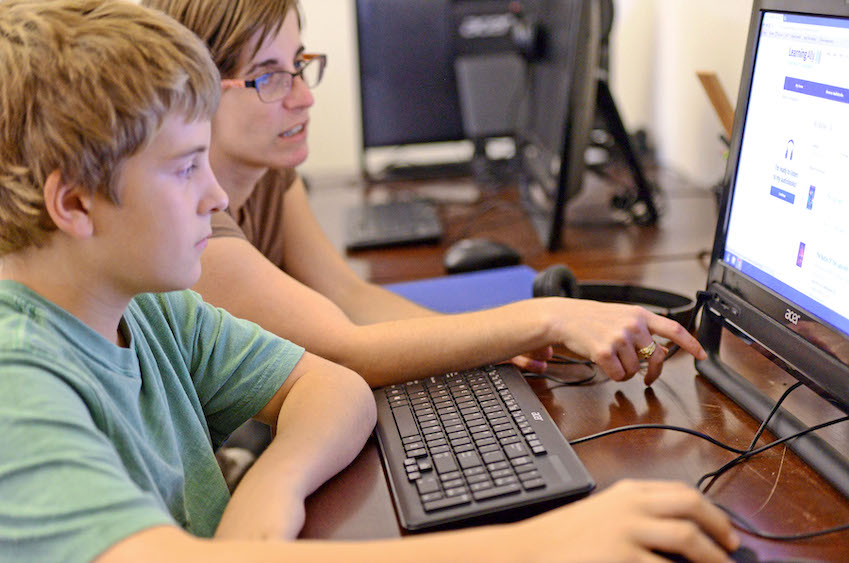BY GLORIA JONES ELLIS, M.A.
Intervention Programs Coordinator – Lighthouse Learning Solutions, LLC
October is dyslexia awareness month, and when it comes to dyslexia, parents and educators are often lacking a clear path to supporting their students! So right now, we want to bring awareness to what dyslexia is and how it can affect students, but even more importantly, bring awareness to the paths that are available for supporting the learning of dyslexic students in the classroom and in the home.
WHAT IS DYSLEXIA?
Dyslexia is another name for a reading disorder, and a reading disorder is identified when a student’s reading is much lower than would be expected based on intellect and education level. Let’s say a fifth-grade student of average intellect has been explicitly taught reading skills along with her peer group. She received phonics instruction in kindergarten and first grade, has been regularly read aloud to at home and at school, has been exposed to grade-level sight words and studied for and taken spelling tests each week, alongside her peers. She has the appropriate cognitive and educational foundation to be reading at a fifth-grade level. Unfortunately, she is only reading and/or comprehending written language at a second grade level. This student would likely be diagnosed with dyslexia.
If a student is struggling with reading but has missed a great deal of instruction due to illness, trauma, educational neglect, or other challenges that have impacted their availability for learning, that student would most likely not be diagnosed with dyslexia. If a student is struggling with reading but also has cognitive limitations as the result of a brain injury or developmental disorder, that student would most likely not be diagnosed with dyslexia.
Dyslexia is a diagnosis for students who have both the perceived cognitive skill and the consistent instructional opportunities to learn to read, but have not yet learned to the expected level.

HOW DOES DYSLEXIA IMPACT STUDENTS?
On a basic, functional level, difficulty reading translates to a number of challenges in our society. By around 8 years of age, children are expected to be able to read and write in order to get information and share their knowledge. This is true in school, in the home, and in community settings. Therefore, students who struggle with reading are at a distinct disadvantage in our society. Beyond just missing out on opportunities to read for pleasure, children with dyslexia will likely fall behind in school (as almost all subjects will require some reading) and will also have trouble reading signs, menus, headlines, recipes, instructions, and more. On an emotional level, all of this can negatively impact self esteem and cause years of frustration with required school activities when these students with dyslexia are not given appropriate instruction and accommodations! Unfortunately, many parents and educators still struggle to find the right balance of accommodation and effective instruction in order to appropriately meet the needs of students with dyslexia.
HOW CAN PARENTS AND EDUCATORS HELP STUDENTS WITH DYSLEXIA?
To explain the best methods for accommodating students with dyslexia, parents and educators must first understand and accept that dyslexia is a disability- a student will not become a better reader by simply trying harder and practicing any more than a deaf student will become better at hearing if they simply try harder and practice! Students with dyslexia need specialized instruction that is appropriately paced to their trajectory of learning. Therefore, and this cannot be overstated, if you are not the person trained in providing the specialized reading instruction that is paced to that particular student’s learning trajectory, you should not be giving out assignments requiring reading, providing assessments of their reading skills, or offering any negative feedback on their reading skills. Your job is strictly to provide positive support and understanding and to accommodate their disability so that their learning and growth in other areas is not hindered. So, what does this look like?
THE ROLE OF THE GENERAL EDUCATION TEACHER
As a general education classroom teacher, you will provide books in your library that are at that student’s independent reading level, you will provide a reader for any required text that is above that student’s independent reading level, and you will allow that student to dictate (to a scribe or digitally) any required written work. Period. That’s it. End of story. You are not the one who will teach a dyslexic student to read and you should not be expected to be that person. You should also not be expecting, demanding, or requiring anything of a student with dyslexia that is beyond their ability, and you especially should not be embarrassing or shaming them when they fall short of your requirements or demands as a result of their disability! While it seems strange that this would need to be explicitly stated, a large portion of educators still fail to understand that they should be accommodating a student’s struggles with reading, fully and automatically, in the same way that they would a student who has a visible disability. Even some teachers who clearly understand that it would be embarrassing and harmful for them to demand a blind student try to read aloud from a book, or a student in a wheelchair to ask for assistance every time they needed to navigate difficult terrain, seem to think that it “builds character” to force a dyslexic student to read aloud, or that they can teach a student “self advocacy” by forcing the student to ask every time they need a scribe rather than taking the lead on providing those accommodations automatically as an educator. As an invested and caring teacher, you need to know the accommodations that will support your students’ learning experiences and provide them automatically, without fail.
THE ROLE OF THE PARENT
As a parent, your role is somewhat similar in terms of providing support and understanding while avoiding demands and expectations that are beyond the skill level of your child with a disability. Additionally, you should make reading an enjoyable aspect of your family life by reading aloud to your child, no matter what their age. Choose books that stimulate your child’s interest to read as a family, even if they are well beyond their independent reading level.
Don’t ask your child to sound it out or say, “I just told you that word!” because that will not help and will likely create barriers to your child’s growth. Instead, just tell them how to read and spell the words they ask for your help with, without passing any judgement.

Focus on the comprehension and imagination and creativity behind the stories you and your child read and write together, not the spelling or the sounding out of words.
While doing this, however, you must actively advocate for your child in the school setting and, when the school is not willing or able to meet your child’s needs, you must find the people who can!
THE ROLE OF THE LITERACY SPECIALIST
Special educators, literacy specialists, and educational therapists are trained in teaching students with reading disorders. As a classroom teacher or a parent, here’s what you should expect from the person or people who are truly responsible for teaching your students with dyslexia to read, whether it’s the resource teacher implementing the IEP program or a private educational therapist working with a family.
First, the specialist should clearly identify the root cause of the reading challenge. After a thorough assessment process, conducted by a psychologist or other qualified professional, they should be able to help you interpret the assessment results in order to identify whether reading challenges are the result of a reading disorder or if they are related to disrupted learning opportunities resulting from cognitive delays, poor school attendance, emotional challenges, weak vision or visual processing, or behavioral issues. The plan for addressing the reading challenges will depend greatly on the identification of their source!
However, if a reading disorder (as initially defined) is identified and/or diagnosed, the professional must go further in identifying the cause of the reading disorder. It’s not enough to simply say that a student isn’t reading well and then start implementing whatever reading program is on hand. Reading fluently means that you can recognize words by sight, “sound out” the words that you don’t recognize, and comprehend what you are reading as you go. Therefore, dyslexia may be the result of weak memory for sight words, difficulty sounding words out, difficulty connecting the written language to its meaning, or a combination of these factors.
The trained specialist will use the assessment process and evaluation results to determine which of these areas need to be addressed and then develop a program of reading intervention designed to target and develop the essential skills!

This professional must also plan a program of intervention that takes place with the frequency and intensity needed in order for the students with dyslexia to truly progress. Furthermore, this professional must also be able to connect with, engage, and motivate students by teaching them about their brains, scaffolding learning tasks so that goals are challenging but attainable, and, above all, creating a fun and emotionally safe learning environment! I guarantee that, for the trained educator, this is not asking too much, so expect nothing less for your child!
Article updated 10/01/2025.
At Lighthouse Learning Solutions, our educational therapy team assists teachers, parents, and students who are looking for support in understanding and addressing dyslexia!



Leave a Reply